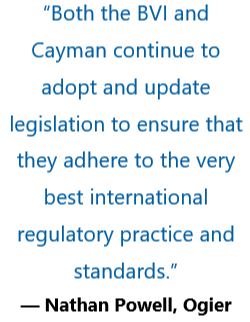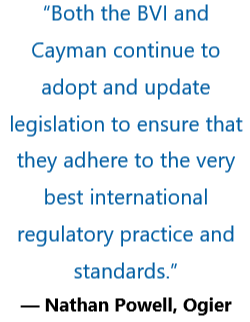
2020年伊始即呈现动荡局面,离岸司法管辖区或将为国际交易、上市、公司注册以及重组提供必需的庇护和支持。
2019年堪称多少之秋——香港抗议,英国脱欧,中美贸易战,日韩冲突,特朗普被弹劾——这些仅仅是这12个月里发生的众多事件中几个令人印象特别深刻的事件。
2020年——新十年的开始——其开局或许预示着这将是一段“疯狂”的旅程。新年伊始,美国和伊朗关系恶化,中东局势动荡,油价上涨,中美贸易协定发展,中国“新冠肺炎”疫情,雅加达洪水,澳大利亚丛林大火;而这些全部都发生在2020年的第一个月份。
凯瑞奥信律师事务所新加坡办事处合伙人及亚洲诉讼,破产和重组业务负责人James Noble认为,飞速发展的21世纪的第二个十年里存在许多变数,将带来更多不确定和挑战。
“所涉因素相当多,但在我看来,其中造成影响最大的是中美贸易战,中国经济放缓,香港乱局,以及即将举行的美国大选;尤其是前三个,促使不良债务水平升高,使企业必须采取措施应对反应激进的债权人,”他说。
Noble认为,鉴于开曼群岛和英属维尔京群岛与中国大陆和美国都存在大量的出入境投资,这些措施中很大一部分都将在这两个司法管辖区实施。
衡力斯律师事务所香港办事处公司事务合伙人Raymond Ng表示,客户已经对未来前景持谨慎态度。
Ng说:“由于全球呈现持续的不确定性——从美中贸易战到最近的美国和伊朗之间的紧张局势升级,我们看到,2020年伊始,一些客户已经开始采取更为保守的做法。”
“还有一些人担心香港的政治危机可能还会继续,”他补充道。
香港示威者提出五大诉求,并强调“五大诉求,缺一不可”;由此看来,Ng对香港政治僵局的评估可能是正确的。
除香港外,在进入21世纪的新十年之际,全球形势似乎在多个方面呈现不确定局面。
经济学人智库(Economist Intelligence Unit,EIU)最近公布了对未来一年的预测。该咨询公司在报告中称,未来的一年,中国的局面可能会更加可控,但同时警告说,中美关系将在更广泛的方面竞争加剧。
“2019年,中美贸易战无疑对跨境并购交易流产生了影响。如果中美两国确实找到了可行的折衷方案,我们预计活动水平将会有所提高,”奥杰律师事务所香港办事处合伙人兼企业法律服务全球负责人Nathan Powell说。
EIU表示,在商业领域中,尽管增长机会的范围越来越小,面向消费者的行业仍然是主要亮点。相比之下,中国科技产业的前景并不乐观。EIU认为,去年该领域的降温将延续至2020年。
他们还提到了未来一年中其他几个“黑天鹅”事件,其中包括:中东动荡局势,不稳定的石油市场,金融压力将继续困扰市场,2019年小型企业和银行的倒闭可能导致大型实体在2020年违约。
“尽管2019年面临挑战,但资本市场活动依然强劲,我们预计这一趋势将持续到2020年。我们在香港的争议解决和破产团队将继续扩大,以满足客户对复杂的英属维京群岛和开曼群岛工作的需求,”Powell说。
避难所
全球局势动荡在不同的国家和市场都造成明确的涟漪反应。
但许多人自始至终都认为离岸司法管辖区为国际交易、上市、公司注册和重组提供了安全港,以应对市场的不确定性。
 “英属维尔京群岛和开曼群岛具有独立、透明和拥有商业头脑的政府以及源自英国普通法的法律体系,因而提供了政治稳定和中立。这些地区经济稳定,没有任何外汇或投资汇回方面的管制,”Ng说道。
“英属维尔京群岛和开曼群岛具有独立、透明和拥有商业头脑的政府以及源自英国普通法的法律体系,因而提供了政治稳定和中立。这些地区经济稳定,没有任何外汇或投资汇回方面的管制,”Ng说道。
此外,Ng认为,就商业监管而言,这些司法管辖区实施灵活而有效的监管。
“除了银行、对冲基金和保险等业务外,英属维尔京群岛和开曼群岛没有采取任何措施对离岸公司的业务行为进行实质性的监管,但前提是这些企业不能在离岸司法管辖区内开展实质性的国内业务,”Ng说。
没有不必要的繁文缛节,却拥有规范的保护系统,这为希望顺利达成交易的企业提供了理想的环境;之所以能够形成这样的条件,是由于离岸司法管辖区对于如何加快和简化重大跨国业务相关的事务有着深刻的了解。
“离岸司法管辖区在重大的跨境交易和重组方面拥有丰富的经验;之所以能够成为金融服务中心,部分原因在于其具有稳定的经济、政治确定性以及行之有效的法律和可行的产品,这些为实现预定的商业目标提供了灵活性,”Noble说。
此外,离岸司法管辖区还拥有成熟而有效的法院系统,可以在需要时获得必要的救济,Noble补充道。
“这些法院可用于解决结构顶层的争议,从而将对于子公司所开展的基础业务的影响降至最低。例如,临时清算人、接管人或检查人员经常被任命到离岸实体,以保护公司资产并调查公司事务,”他说。
“这在开曼群岛这样的地方特别实用,因为临时清算可以暂停对公司的债权,并将为公司提供临时保护,使其免于受到心怀不满的债权人和股东的侵害。”
基本上来说,英属维尔京群岛和开曼群岛是“经过考验的司法管辖区,为该地区市场从业人员所熟悉,而且为构建交易提供了稳健、灵活而又明确的法律框架,”Powell说道。
“虽然全球普遍存在不确定性,但我们看到,我们的亚洲收入持续增长,并且在我们所有的业务领域都存在强劲的需求,”Powell表示。
好处和注意事项
有需求是有原因的。有些人可能会说原因是多方面的。离岸律师事务所的许多律师们可以证实,他们在离岸司法管辖区的工作令他们的客户受益。
“我所接触的大多数纠纷都是由于企业或者拥有企业的股东受到某种形式的经济压力。例如,我最近帮助一家公司阻止了一位不满的股东采取行动——这位股东试图强行收购他们的股票,”Noble以他的亲身经历告诉记者。
“在另一个案例中,我成功地挑战了一项阻止一家公司开展某些活动的禁令,该禁令的后果将会对该公司的业务造成损害。”
此外,离岸司法管辖区还拥有其他的附带福利。
首先,在离岸司法管辖区可以简化一些潜在的复杂重组。
“我们一直在为一些大的集团重组业务提供法律咨询服务,这些重组活动涉及到各子公司的迁移和合并,从而精简所使用的离岸司法管辖区的数量,”Powell说。
“对于结构复杂的大型跨国集团,简化集团结构,减少所涉及的司法管辖区,能够降低合规成本和减少管理时间。根据我们以往的经验,这些类型的重组中往往使用离岸结构,因为这样的结构能够提供稳健、常见的的法律框架。”
当然,离岸地区的税收优惠也是众所周知的。
“由于是税务中立的司法管辖区,因此在英属维尔京群岛或开曼群岛,不会对涉及英属维尔京群岛或开曼群岛注册的公司的交易进行征税,”Ng说。
虽然如此,他还是建议潜在客户就其税务状况寻求税务方面的建议,因为以股息形式从英属维尔京群岛或开曼群岛公司获得的任何收入都有可能需要在股东作为税收居民的司法管辖区纳税。
更大的灵活性
但税务方面的问题并不是潜在客户在进行离岸经营时需要注意的唯一问题。
“离岸经营为客户在其业务方面提供了更大程度的灵活性。然而客户还应该注意,在其结构中使用离岸实体,他们就需要做好准备应对任何与离岸法院相关的问题,”凯瑞奥信的Noble说。
离岸地区的监管政策也随着时代的发展而不断发展,旨在为该地区的经营者提供更好地服务和保障。
“英属维尔京群岛和开曼群岛都在不断进行新的立法并对现有法律进行更新,以确保符合最佳国际监管惯例和标准。去年,英属维尔京群岛和开曼群岛均引入了经济实质法,开曼群岛还引入了数据保护规则,今年在英属维尔京群岛也将实施相关立法,”Powell说。
他表示其团队与离岸地区的发展保持同步,并且花时间确保其客户能够跟上这些发展的速度,准备好按照要求作出改变。
“因此,我们的客户通常能够迅速适应变化,而不会对其运营造成不利影响。客户们需要了解这些发展,以及如何应对由此带来的变化,从而把影响降到最低,”Powell说。
Powell认为,律师需要与客户密切合作,帮助他们了解和掌握经济实质法和新数据保护规则所带来的影响。
对于进行离岸交易的公司来说,离岸律师事务所当然是他们主要的咨询服务提供者。
“离岸律所有全备的能力为企业提供建议,帮助他们更好地安排事务,解决其跨境业务中出现的复杂、有争议的问题,”Noble说。
“又或者企业可能需要对离岸实体提出索赔,但由于缺乏这些实体的可用信息,例如其董事、股东或资产的身份,因而无法取得进展。在这种情况下,离岸诉讼律师可以利用一系列工具来获取这些信息,这在违反信托义务索赔,共谋指控和追查资产方面尤为有用,”他补充说。
Ng表示,企业还可以在其他方面寻求离岸律师事务所的服务和帮助。
他说:“谈到设立公司、基金或信托机构,对于那些寻求灵活性和确定性的人来说,离岸司法管辖区仍然是热门的目的地;因此,我们看到对离岸法律服务的需求持续大幅增加。”
离岸律师事务所与其客户一起迅速成长,旨在满足他们的所有需求。
衡力斯的Ng说:“面对越来越老练的客户,离岸律所做出了回应——通过提供全方位的服务来满足其所有的法律需求,包括银行和金融,公司,投资基金,诉讼,破产和重组,私人财富以及监管和税务方面的事务。”随后他又补充道,衡力斯以能够为其所有的客户提供真正的“一站式”服务而感到自豪。
Safer Havens
With 2020 looking shaky, offshore jurisdictions can provide much-needed shelter and support for international deals, listings, incorporations and restructurings.
The year 2019 was an eventful one: the Hong Kong protests, Brexit, the trade wars between the U.S. and China, and Japan-South Korea, and Trump’s impeachment were just a few of the events that left their mark on those 12 months.
And if the start of 2020 is anything to go by, we are in for a wild ride over the new decade as well. The year kicked off with unrest in the Middle East between Iran and the U.S., rising oil prices, U.S.-China trade deal developments, a new respiratory disease virus emerging in China, the Jakarta floods, and the Australian bushfires. And of these happened in just the first month.
James Noble, partner and head of litigation, insolvency and restructuring practice of Asia in Carey Olsen’s Singapore office, believes many variables could create uncertainty and challenges in the second roaring 20s.
“There is a fairly long list of candidates but in my view, the most important ones are the tensions caused by the U.S.-China trade war, China’s economic slowdown, the civil unrest in Hong Kong and the impending U.S. election. The first three of these, in particular, are contributing towards increased levels of distressed debt and the need for companies to take measures to deal with aggressive creditors,” he says.
Noble thinks a significant proportion of those measures will occur in the Cayman Islands and the British Virgin Islands, given the high levels of inbound and outbound investment that both jurisdictions have with Mainland China and the U.S.
Raymond Ng, Hong Kong-based corporate partner at Harneys, sees clients already cautious about what lies ahead.
“We have seen some clients taking a more conservative approach at the beginning of 2020 in light of the continuing uncertainties in the world from the U.S.-China trade war to the recent escalating tension between Iran and the U.S.,” says Ng. “Some also fear the political crisis in Hong Kong may continue,” he adds.
Given that the Hong Kong protestors have been asking for “five demands, not one less,” it would seem likely that Ng’s assessment of a political impasse may be correct.
Besides Hong Kong, it seems the global situation remains uncertain on multiple fronts as we head into this new decade.
The Economist Intelligence Unit (The EIU) recently published its predictions for the year ahead. In the report, the advisory firm says it believes that the coming year is likely to be more manageable for China but warns that the broader U.S.-China relationship remains on a course of increasing competition.
“In 2019, the U.S.-China trade war undoubtedly had an impact on the cross-border M&A deal flow. If the U.S. and China do find a workable compromise, we would expect that activity levels will improve,” says Nathan Powell, partner and global head of corporate legal services in Ogier’s Hong Kong office.
In the business world, the EIU says consumer-facing sectors remain the main bright spots even as growth opportunities are becoming more niche.
However, the outlook for China’s technology industry is less optimistic by contrast. The EIU believes the cooling that was shown in the segment last year will extend into 2020.
They also named other black swans in the year ahead. This includes unrest in the Middle East; an unsteady oil market; financial strains that will continue to plague markets; and the failures of small companies and banks in 2019 possibly resulting in a major entity defaulting in 2020.
“Notwithstanding the challenges in 2019, capital markets activity was strong, and we anticipate that trend to continue into 2020. Our dispute resolution and insolvency teams in Hong Kong will continue to expand to meet client demand for complex British Virgin Islands (BVI) and Cayman work,” says Powell.
SHELTER FROM THE STORM
The volatility of world events has definite ripple effects in different countries and markets.
But through it all, many believe offshore jurisdictions provide a safe harbour for international deals, listings, incorporations, and restructurings against market uncertainty.
“The BVI and Cayman Islands provide political stability and neutrality, with independent, transparent and business-minded governments and a legal system derived from English common law. They have secure economies without any exchange or investment repatriation controls,” says Ng.
Furthermore, Ng believes these jurisdictions offer light but effective regulation from a business regulatory perspective.
“Except for certain businesses such as banking, hedge funds and insurance, the BVI and Cayman Islands do not seek to materially regulate the conduct of business of offshore companies, provided that they are not conducting substantial domestic business within the territories,” says Ng.
That’s always a plus for companies looking to seal deals without the burden of unnecessary red tape but in an environment with systemic protection in place. This situation is due to offshore jurisdictions having a keen understanding of what is needed to expedite and ease major trans-national business affairs.
“Offshore jurisdictions are seasoned veterans of high-profile, cross-border transactions and restructurings. Part of their appeal as financial services hubs is that they have stable economies, political certainty and the availability of laws and products which provide flexibility for achieving the desired commercial objectives,” Noble says.
In addition, Noble says there are sophisticated and effective court systems in place for obtaining the necessary relief, when required.
“Those courts can be used to resolve disputes at the Topco level of the structure, which minimises the impact on the underlying business being conducted by the subsidiaries. For example, provisional liquidators, receivers or inspectors are frequently appointed over offshore entities to safeguard company assets and to investigate the company’s affairs,” he says.
“This can be especially helpful in places like the Cayman Islands where provisional liquidation provides a moratorium on claims against the company and will give it interim protection against disgruntled creditors and shareholders.”
Essentially, Powell says the BVI and Cayman are “tried and tested jurisdictions that are familiar to market practitioners in the region, and they provide a robust, flexible and clear legal frame-work to structure transactions.”
“Despite the prevailing global uncertainty, we have continued to see growth in our Asia revenue and strong demand across our practice areas,” says Powell.
BENEFITS AND CONSIDERATIONS
There is demand for a reason. In fact, some might say there are a number of reasons; many lawyers from offshore law firms can attest to how working in these jurisdictions has benefitted their clients.
“Most of the disputes that I am involved with arise out of some form of economic pressure on either the business or on the shareholders that own it. For example, I recently helped a company block actions taken by an unhappy share-holder to try and force a buy-out of their shares,” says Noble of his experiences.
“In another case, I successfully challenged an injunction that had been brought to prevent a company from undertaking certain activities, the effect of which would have been crippling to the business.”
Other fringe benefits make offshore jurisdictions a worthwhile consideration.
For starters, working in offshore jurisdictions can simplify some potentially complicated restructuring.
“We have been advising on some significant group reorganisations involving the migration and consolidation of various subsidiary holding companies to streamline the number of offshore jurisdictions used,” says Powell.
“For large international groups with complex structures, rationalising the group structure into fewer jurisdictions has reduced compliance costs and management time. We have seen the continued use of offshore structures in these types of reorganisation as they still offer a robust and familiar legal framework.”
And, of course, there are the tax benefits offshore locations are known for.
“As they are tax neutral jurisdictions, no taxes would be imposed in the BVI or Cayman Islands on transactions involving BVI or Cayman Islands companies,” says Ng.
Nonetheless, he recommends that prospective clients seek tax advice on their tax position, as any income received from BVI or Cayman Islands companies in the form of dividends may be subject to tax in the jurisdiction in which the shareholder is a tax resident.
GREATER FLEXIBILITY
That’s not the only thing that prospective clients need to be aware of regarding operating offshore.
“Operating offshore provides clients with a much greater degree of flexibility in how they set up their busi-ness. However, clients should also be aware that by using offshore entities in their structures, they need to be prepared to resolve any issues which arise in the offshore courts,” says Carey Olsen’s Noble.
The offshore regulations also continue to evolve with the times to better serve and protect those that operate within them.
 “Both the BVI and Cayman continue to adopt and update legislation to ensure that they adhere to the very best international regulatory practice and standards. Last year saw the introduction of economic substance legislation in the BVI and Cayman and data protection rules in Cayman with legislation to follow this year in the BVI,” says Powell.
“Both the BVI and Cayman continue to adopt and update legislation to ensure that they adhere to the very best international regulatory practice and standards. Last year saw the introduction of economic substance legislation in the BVI and Cayman and data protection rules in Cayman with legislation to follow this year in the BVI,” says Powell.
He claims his team has kept in step with the developments and spent time ensuring that clients are up to speed on these developments and prepared for any changes that are required.
“As a result, clients have generally been able to adapt quickly and without undue impact on their operations,” says Powell. “Clients need to understand these developments and how to deal with any changes with minimal impact.”
Powell believes lawyers need to work closely with clients to help them understand and navigate the impact of the economic substance legislation and the new data protection rules.
Of course, offshore law firms are the main source of advice for companies that have any offshore dealings.
“Offshore firms are well placed to advise companies on better ways to arrange their affairs as well as to address complex and contentious issues which occur in their cross-border operations,” says Noble.
“Alternatively, companies may have claims against offshore entities that can’t progress because of a lack of available information about those entities, such as the identity of their directors, shareholders or assets. In those situations, offshore litigators have an array of tools at their disposal for obtaining that information, which can be particularly useful for breach of fiduciary duty claims, conspiracy claims, and asset tracing,” he adds.
For Ng, there are other reasons why companies should consider the services of offshore law firms.
“Offshore jurisdictions remain popular destinations for those seeking flexibility and certainty when it comes to establishing a company, fund or trust and, as a result, we are continuing to see a surge in demand for offshore legal services,” he says.
Offshore law firms are quickly growing alongside their clientele to meet all their needs.
“Clients are becoming increasingly sophisticated and offshore firms have responded by offering a full spectrum of services to meet all of their legal needs, including banking and finance, corporate, investment funds, litigation, insolvency and restructuring, private wealth, and regulatory affairs and tax,” says Harneys’ Ng, who adds that his firm prides itself on being able to provide a true “one-stop” service to all of their clients.
To contact the editorial team, please email ALBEditor@thomsonreuters.com.





